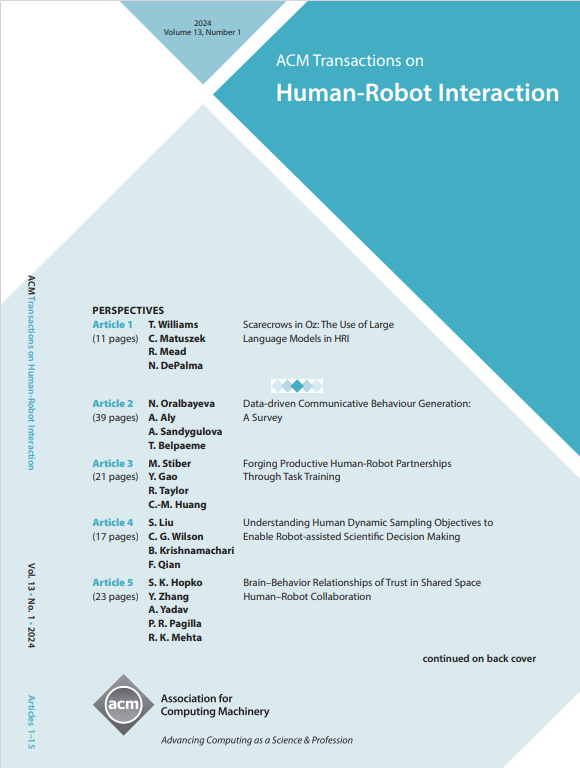Effortless Polite Telepresence using Intention Recognition
IF 5.5
Q2 ROBOTICS
引用次数: 0
Abstract
Telepresence technology creates the opportunity for people that were traditionally left out of the workforce to work remotely. In the service industry, a pool of novice remote workers could teleoperate robots to perform short work stints to fill in the gaps left by the dwindling workforce. A hurdle is that consistently talking appropriately and politely imposes a severe mental burden on such novice operators and the quality of the service may suffer. In this study, we propose a teleoperation support system that lets novice remote workers talk freely without considering appropriateness and politeness while maintaining the quality of the service. The proposed system exploits intent recognition to transform casual utterances into predefined appropriate and polite utterances. We conducted a within subject user study where 23 participants played the role of novice remote operators controlling a guardsman robot in charge of monitoring customers’ behaviors. We measured the workload with and without using the proposed support system using NASA task load index questionnaires. The workload was significantly lower (p <.001) when using the proposed support system (M = 46.07, SD = 14.36) than when not using it (M = 62.74, SD = 12.70). The effect size was large (Cohen’s d = 1.23).利用意图识别技术轻松实现礼貌网真
网真技术为传统上被排除在劳动力队伍之外的人员创造了远程工作的机会。在服务行业,一批远程新手可以通过远程操作机器人来完成短期工作,以填补劳动力减少带来的空缺。一个障碍是,始终保持适当和礼貌的交谈方式会给这些新手操作员带来严重的心理负担,服务质量可能会受到影响。在本研究中,我们提出了一种远程操作支持系统,让远程操作新手在不考虑适当性和礼貌性的情况下自由交谈,同时保持服务质量。所提议的系统利用意图识别将随意的话语转换为预定义的适当和礼貌的话语。我们进行了一项用户研究,让 23 名参与者扮演远程操作员新手,控制一个负责监控客户行为的警卫机器人。我们使用 NASA 任务负荷指数问卷,测量了使用和未使用拟议支持系统时的工作量。使用建议的支持系统时,工作量(M = 46.07,SD = 14.36)明显低于未使用时(M = 62.74,SD = 12.70)(p <.001)。效应大小较大(Cohen's d = 1.23)。
本文章由计算机程序翻译,如有差异,请以英文原文为准。
求助全文
约1分钟内获得全文
求助全文
来源期刊

ACM Transactions on Human-Robot Interaction
Computer Science-Artificial Intelligence
CiteScore
7.70
自引率
5.90%
发文量
65
期刊介绍:
ACM Transactions on Human-Robot Interaction (THRI) is a prestigious Gold Open Access journal that aspires to lead the field of human-robot interaction as a top-tier, peer-reviewed, interdisciplinary publication. The journal prioritizes articles that significantly contribute to the current state of the art, enhance overall knowledge, have a broad appeal, and are accessible to a diverse audience. Submissions are expected to meet a high scholarly standard, and authors are encouraged to ensure their research is well-presented, advancing the understanding of human-robot interaction, adding cutting-edge or general insights to the field, or challenging current perspectives in this research domain.
THRI warmly invites well-crafted paper submissions from a variety of disciplines, encompassing robotics, computer science, engineering, design, and the behavioral and social sciences. The scholarly articles published in THRI may cover a range of topics such as the nature of human interactions with robots and robotic technologies, methods to enhance or enable novel forms of interaction, and the societal or organizational impacts of these interactions. The editorial team is also keen on receiving proposals for special issues that focus on specific technical challenges or that apply human-robot interaction research to further areas like social computing, consumer behavior, health, and education.
 求助内容:
求助内容: 应助结果提醒方式:
应助结果提醒方式:


